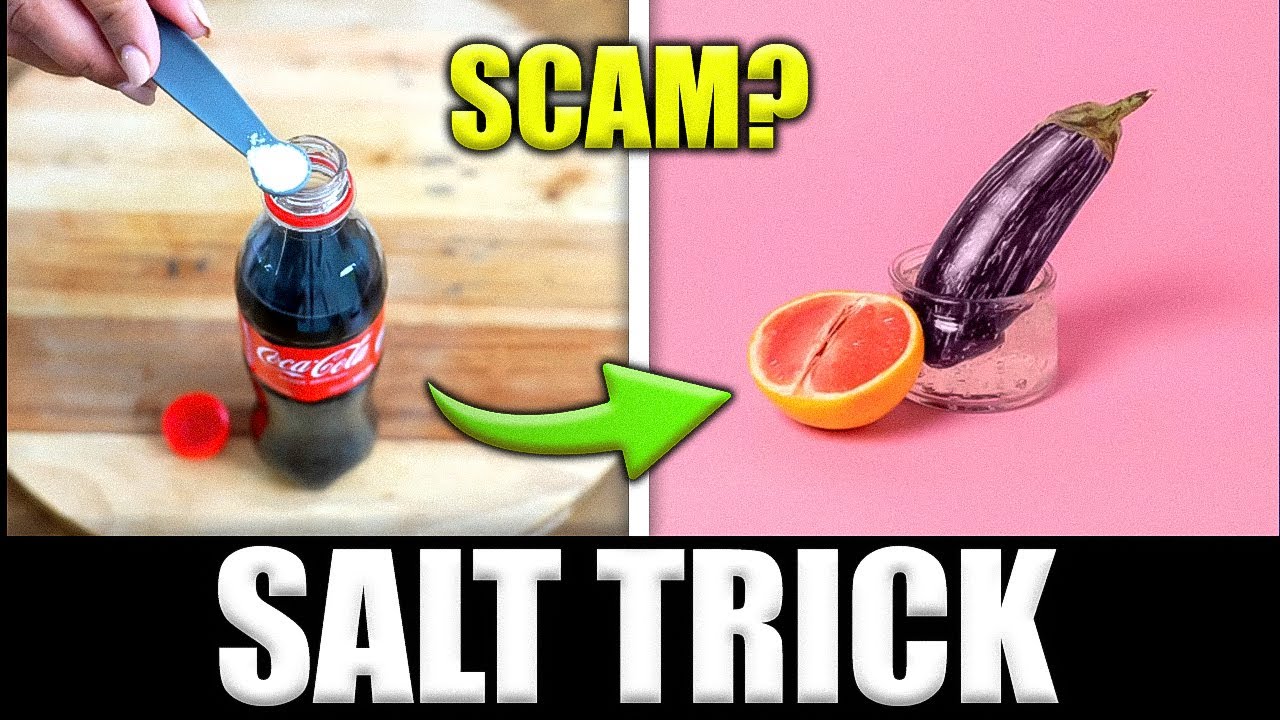Is Salt Trick For Men A Scam? The Ultimate Truth Revealed
Listen up, folks! If you’ve been hearing whispers about the so-called "salt trick for men," you’re not alone. It’s been floating around online, and people are buzzing about whether it’s legit or just another scam. So, what’s the deal? Is this a game-changer, or is it all hype? Let’s dive in and find out!
First things first, the salt trick for men has been touted as a miracle solution for everything from boosting testosterone to improving energy levels. But is there any scientific backing to these claims? Or is it just another clickbait scheme designed to part you from your hard-earned cash? We’re here to separate fact from fiction and give you the lowdown on whether this trend is worth your time.
Let’s be real, though—there’s no shortage of "miracle cures" out there. From detox teas to miracle pills, the market is flooded with products promising quick fixes. But when it comes to your health, you’ve gotta be careful. That’s why we’re breaking down the salt trick phenomenon and answering the burning question: Is it legit, or is it a total scam?
What Exactly Is the Salt Trick for Men?
Alright, let’s start with the basics. The salt trick for men is basically the idea that consuming a specific amount of salt can have some pretty impressive health benefits. Some proponents claim it can help with hormone balance, reduce stress, and even improve sleep quality. Sounds too good to be true, right? Well, buckle up, because we’re about to break it down for you.
Here’s how it supposedly works: you dissolve a small amount of unrefined sea salt in water and drink it on an empty stomach. Boom! Instant health boost, or so they say. But before you start chugging saltwater like it’s going out of style, let’s take a closer look at the science—or lack thereof—behind these claims.
Why Is Salt Suddenly So Popular?
Now, you might be wondering why salt is suddenly being hailed as the next big thing in men’s health. Well, it all comes down to the fact that our bodies need sodium to function properly. Sodium plays a key role in maintaining fluid balance, nerve function, and muscle contractions. But here’s the kicker—most of the salt we consume comes from processed foods, which are packed with the refined stuff.
Unrefined sea salt, on the other hand, contains trace minerals that aren’t found in your average table salt. Proponents of the salt trick argue that these minerals are the key to unlocking its health benefits. But does that mean you should start guzzling saltwater every morning? Not so fast.
Is There Any Scientific Evidence Supporting the Salt Trick?
Here’s where things get a little dicey. While salt is essential for our bodies, there’s not a ton of scientific evidence backing up the claims made by salt trick enthusiasts. Sure, sodium is important, but that doesn’t mean chugging saltwater is going to magically transform your health.
In fact, some experts warn that consuming too much sodium can actually do more harm than good. Excessive salt intake has been linked to high blood pressure, heart disease, and other health issues. So, while a little salt is necessary, going overboard can be dangerous.
What Do the Experts Say?
We reached out to a few nutritionists and doctors to get their take on the salt trick. Here’s what they had to say:
- Dr. Sarah Thompson: "While unrefined sea salt does contain trace minerals, there’s no evidence to suggest that drinking saltwater has any significant health benefits. In fact, it could be harmful if consumed in large amounts."
- Nutritionist Mark Davis: "The idea that salt can boost testosterone levels is purely anecdotal. There’s no scientific basis for these claims."
So, while the salt trick might sound appealing, it’s important to take these claims with a grain of salt—pun intended.
Common Myths About the Salt Trick
There’s a lot of misinformation floating around about the salt trick, so let’s debunk some of the most common myths:
Myth #1: Saltwater Can Cure Hormonal Imbalances
Sorry, folks, but this one just doesn’t hold water. While sodium is important for maintaining electrolyte balance, there’s no evidence to suggest that drinking saltwater can cure hormonal imbalances. Hormonal health is complex and influenced by a variety of factors, including diet, exercise, and genetics.
Myth #2: The Salt Trick Can Boost Testosterone Levels
Another popular claim is that the salt trick can boost testosterone levels. Again, there’s no scientific evidence to support this. Testosterone levels are influenced by a variety of factors, including age, lifestyle, and overall health. If you’re concerned about your testosterone levels, it’s best to consult with a healthcare professional.
Myth #3: Drinking Saltwater Is Safe for Everyone
This one’s a big no-no. While a small amount of saltwater might not harm most people, excessive consumption can be dangerous, especially for those with pre-existing health conditions like high blood pressure or kidney disease. Always consult with a doctor before trying any new health trend.
Who Should Avoid the Salt Trick?
Not everyone should jump on the salt trick bandwagon. Here are a few groups of people who should steer clear:
- People with high blood pressure
- Individuals with kidney disease
- Those on a low-sodium diet
- Anyone with a history of heart disease
If you fall into any of these categories, it’s best to avoid the salt trick altogether. Your health is too important to risk on a trend that hasn’t been scientifically proven.
Alternatives to the Salt Trick
So, if the salt trick isn’t the answer, what is? Here are a few science-backed alternatives to improve your health:
1. Balanced Diet
Eating a balanced diet rich in whole foods is one of the best things you can do for your health. Focus on incorporating plenty of fruits, vegetables, lean proteins, and healthy fats into your meals.
2. Regular Exercise
Exercise is key to maintaining overall health and wellness. Whether it’s hitting the gym, going for a run, or practicing yoga, find an activity you enjoy and stick with it.
3. Stress Management
Stress can wreak havoc on your health, so it’s important to find ways to manage it. Meditation, deep breathing, and spending time in nature are all great ways to reduce stress levels.
How to Incorporate Salt into Your Diet Safely
If you’re looking to incorporate more salt into your diet, here are a few tips to do so safely:
- Choose unrefined sea salt over table salt for its mineral content
- Use salt sparingly and be mindful of your overall sodium intake
- Balance salt consumption with plenty of water to stay hydrated
Remember, moderation is key. A little salt can enhance the flavor of your food, but overdoing it can have negative consequences.
Final Verdict: Is the Salt Trick for Men a Scam?
So, after all that, is the salt trick for men a scam? The answer is a resounding maybe. While there’s no denying that our bodies need sodium, the claims made by salt trick proponents simply aren’t backed by science. That doesn’t mean you should avoid salt altogether, but it does mean you should approach this trend with caution.
If you’re looking to improve your health, focus on making sustainable lifestyle changes rather than relying on quick fixes. Eat a balanced diet, exercise regularly, and take care of your mental health. Your body will thank you for it.
Take Action: What’s Next?
Now that you’ve got the facts, it’s time to take action. Share this article with your friends and family to help them separate fact from fiction when it comes to the salt trick. And if you’ve got any questions or comments, drop them below—we’d love to hear from you!
Remember, your health is one of the most important things you’ve got. Don’t fall for scams or quick fixes—stick with what’s proven to work. Your future self will thank you for it.
Bollyflix Official Site: The Ultimate Guide To Streaming Bollywood Magic
Sone. 436: The Ultimate Guide To A Phenomenon That's Taking The World By Storm
Yang Yang And Zhao Lusi Relationship: The Ultimate Guide To Their Love Story

SALT TRICK (⚠️SCAM OR LEGIT?⚠️) SALT TRICK FOR MEN VIDEO WHAT IS THE

Salt Trick For Men A Scam Exposed

Is the Salt Trick a Scam? Uncovering the Truth Behind Myths